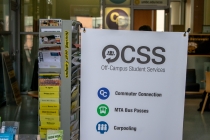While 75 percent of the UMBC population experiences typical dorm life as a residential student, the remaining students commute back and forth between college and home. In fact, UMBC opened its doors in 1966 as a commuter school with no residential halls at all.
“I live about half an hour away and I chose to commute to save myself a couple [thousand dollars],” said Monomi Runsewe, a freshman mathematics and economics double major. “I feel campus life is still fun, but probably less fun than it would be [if I were] a resident.”
Saving money was also an incentive to commute for Yohannes Feleke, a junior studying information systems. “Saving on expenses was the reason for being a commuter which […] came with unexpected difficulties like long distance driving and struggling with finding parking,” he shared.
Despite these challenges, there exists on campus an organization dedicated to making college life easier for not only commuters but also for transfers, adult learners and veterans. Off-Campus Student Services (OCSS), located on Mainstreet of the Commons to the right of the Bookstore, is directed by Dr. Antonio Silas, who develops methods for these student populations to adjust to campus life.
“Since there is a kind of disconnect with students that live off-campus as opposed to living on-campus, what we strive to do is be a source of information for those students,” said Silas. He also emphasized the importance of making sure that people who live off-campus strive to get involved, as students who participate in organizations and activities on campus are more successful in college than those who do not.
Regarding the adult and veteran students, he mentioned that the organization strives to help them adjust to UMBC, adding, “[They] need people they can go to as well in terms of helping them make sense of things if it’s not clear to them.”
Student helpers also ensure that the transition to college life is a bit easier for their fellow Retrievers. Keith Ferguson, a junior commuter assistant who is majoring in information systems, stated that his role is to “plan events […] aimed toward commuter students.” He recalled that at the beginning of the semester, he helped kick off the commuter and transfer retreats, in which incoming freshman commuters either went to Genesee Valley or stayed on campus for a team cup challenge; meanwhile, transfers had a trip to the National Aquarium to connect with new classmates and learn more about what UMBC would have in store for them.
Silas and Ferguson also explained that some of the events that OCSS puts on include free breakfast for commuters on Tuesdays, commuter connections and transfer student network workshops, along with special events throughout the semester to ensure that students are getting involved. Recently, they sponsored a Retriever Madness meet-up, in which OCSS hosted a free pizza gathering before walking everyone over to the Event Center together for the basketball season kick-off.
There is no doubt that commuting poses some challenges that make life at UMBC a little more difficult than it would be with the convenience of living on campus. Nevertheless, Silas and the OCSS helpers work hard to ensure that Retrievers of the Off-Campus Student Services community are making the most out of their time on campus.

